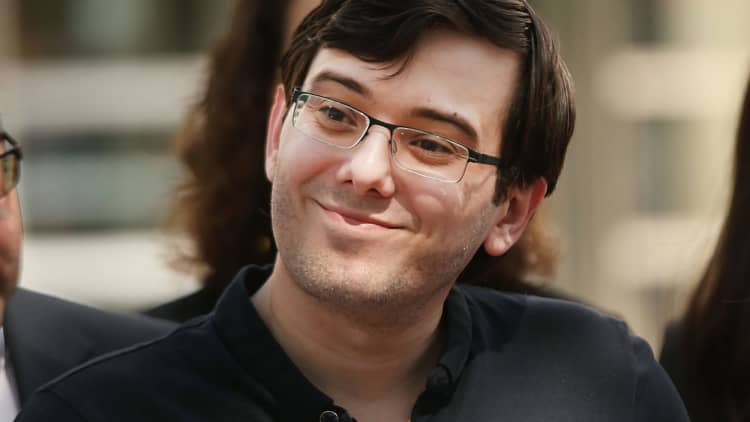Convicted "pharma bro" fraudster Martin Shkreli boasted before being sentenced that a psychological examination would show "I have a 150 IQ and no overt psychological issues," a new court filing reveals.
Shkreli also suggested in jailhouse correspondence in January that he would publicly distribute the results of the exam because he was "going to enjoy the psych test results."
"I want to watch the press squirm" when they saw what a psychologist who examined him in advance of his sentencing had to say about him, Shkreli wrote, according to the court filing by federal prosecutors.
But it turned out that the psychologist, Dr. David Salsberg, found that Shkreli suffers from "generalized anxiety disorder, major depressive disorder and unspecified personality disorder," the court filing notes.
The exam also found Shkreli's actions were "consistent with a narcissistic outlook," "faulty judgment," "a sense of entitlement," and "denial, and rationalization in order to preserve his self-image."
"Also salient is a seeming preoccupation with thoughts of success and a rather undisciplined imagination that takes liberties with reality at times," the psychologist wrote, according to the court filing.

And, in a sharp footnote, prosecutors wrote, "Dr. Salsberg's report does not state that Shkreli has an IQ of 150."
The damning comments are coming to light now because prosecutors un-redacted sections of the original sentencing memorandum they had filed last week.
Shkreli, who turns 35 on Saturday, was sentenced March 9 to seven years in prison for securities fraud related to a drug company he founded and two hedge funds he had run.
The crimes were unrelated to his raising the price of the drug Daraprim at another drug company, an act that gained him widespread notoriety.
Shkreli wept openly as he asked Judge Kiyo Matsumoto to give him a relatively light sentence. Prosecutors had asked for 15 years in prison. Defense lawyers requested a term of no more than 18 months.
While defense lawyers had cited the results of the psychological exam by Salsberg in their bid for leniency, prosecutors criticized the exam for being based solely on interviews with Shkreli and family members, as well as clinical notes from another doctor that Shkreli consulted between 2005 and 2016.
Prosecutors wrote that it was significant that Salsberg did not review documents related to Shkreli's criminal conduct, nor did he review Shkreli's online harassment and threats against women – including Hillary Clinton.

But "even based on the limited information that he did review, Dr. Salsberg's report is replete with observations of Shkreli's propensity to lie and obfuscate due to his overconfidence, his refusal to admit failure and his fundamental, unshakable belief that the ends always justify the means, no matter the cost."
Prosecutors said those observations backed up their argument that Shkreli deserved to be locked up for a very long time.
They noted that "Shkreli made multiple statements to Dr. Salsberg that seek to attribute many of his actions to being misunderstood by others or to having a sense of humor others do not appreciate—a way to shift the blame away from himself for his actions."
Salsberg had written in his report that:
– "[Shkreli] endorsed some exaggerating and dishonesty to further his image as successful and smart, but also genuinely believed that he was helping people."
– Shkreli reported only "some shame, and regret for his actions and desires to make changes."
– Shkreli was "reflective on some of his impulsive and misguided actions, albeit framing much of it as not being understood correctly and getting caught up in what he perceived as his sense of humor and actions to draw attention."
Prosecutors said many of Salsberg's findings were consistent with "the personality traits of deceit, rationalization and a failure to accept responsibility:
– "His difficulty with accurately assessing people and events leaves him prone to use arbitrary reasoning to explain decisions he has made, to employ faulty judgment, and to draw erroneous conclusions. In essence, Mr. Shkreli demonstrates a tendency to act on ill-conceived perceptions. He is also likely to deal with challenging situations in an escapist manner, especially when under stress. Rather than clearly thinking through what he can do, he may withdraw in his imagination or intellectualization."
– "He demonstrates tendencies to become preoccupied with his own views at the expense of taking perspective from all angles. This is consistent with a narcissistic outlook, in that he possesses a sense of entitlement and a tendency to externalize responsibility."
– "When he does not achieve the outcomes he perceives as successful, he is likely to experience panic-like anxiety, frustration and negativity, and to employ maladaptive defenses such as denial and rationalization in order to preserve his self-image."
– "Also salient is a seeming preoccupation with thoughts of success and a rather undisciplined imagination that takes liberties with reality at times. Relatedly, he is cognitively inclined to transform failures into successes and construct intricate rationalizations."
– "He may have illusions of invincibility and truly believes that he can undertake and accomplish more than is realistic. But again, he has had reinforcement of this style by actual successes. Whatever uncertainty he may have in his abilities is likely suppressed."
Prosecutors wrote that in spite of his observations, Salsberg had said in his report that he believes Shkreli "has gained insight and remorse from recent events and presents with a different outlook and perspective and is in a unique and new place for his receptivity for such interactions."
But prosecutors argued that "Salsberg provides absolutely no empirical basis for this conclusion."
"Finally, it is notable that Shkreli's own correspondence indicates that he sees even Dr. Salsberg's report itself as a means to an end," prosecutors wrote.
"On January 8, 2018, prior to receiving Dr. Salsberg's final report, Shkreli stated in email correspondence from prison that he was 'going to enjoy the psych test results,' " according to prosecutors.
"Shkreli then discussed having report disseminated publicly because, as he stated, 'I want to watch the press squirm when they see I have a 150 IQ and no overt psychological issues.' That is, Shkreli wanted to use the report as a means to prove his intelligence to members of the press with whom he frequently disagrees," prosecutors wrote.
WATCH: Co-worker says Shkreli 'mentally unstable'



